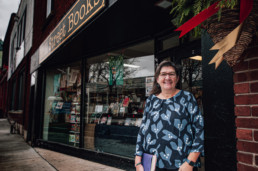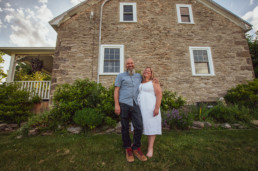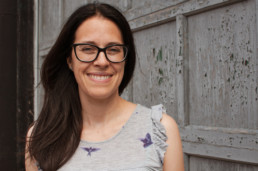“They’re alone and lonely and don’t know what each day holds. And every time there’s a knock on the door, I can sense their mouths go dry, their stomach constrict. They believe they are already dead. How many times can you feel death so close without little parts of you dying, particle by particle?"
—Carolyne Van Der Meer, Motherlode: A Mosaic of Dutch Wartime Experience
Carolyne Van Der Meer had heard stories about her family hiding Jews and fighting in the Resistance in Nazi-occupied Holland, but it never went any deeper. Her mother Wilma, who was seven when WWII ended, shared very little of her wartime experiences. Remembering is to invite a world of trauma and pain and Wilma preferred to dwell on happier things.
But when she started a creative writing program at the Humber School for Writers in Toronto, Carolyne immediately knew that what she wanted was to tell her mother’s story and preserve it for her son.
To give of one’s self, to be open and vulnerable is a difficult thing to do. But when Carolyne asked her mother to share her story, she agreed despite having refused similar requests from others in the past. Her daughter had asked—how could she refuse?
And so through handwritten letters, Carolyne delicately probed, unravelling the gossamer details piece by piece, letter by letter, until the buried history of her mother’s past revealed itself.
The result, which grew to include other stories from Dutch families living in Holland during the war, and Carolyne’s own reflections, was Motherlode: A Mosaic of Dutch Wartime Experience—her first and most personal book.
Following the success of Motherlode (2014), Carolyne has gone on to publish two collections of poetry: Journeywoman (2017) and Heart of Goodness: The Life of Marguerite Bourgeoys in 30 poems (2020). The latter, which Carolyne translated herself into French, was awarded second place in the poetry category of the 2021 Catholic Media Association’s Annual Book Awards and was shortlisted in The Word Guild’s annual Word Awards.
Together these collected works tell stories from a distinctively feminine perspective. Not that Carolyne considers herself to be a particularly staunch feminist—she’s not interested in a battle of the sexes but in recognizing through her writing that the female journey is unique.
“Let’s try to understand that journey, why it might be different and why it’s important,” she says.
But if you ask Carolyne what her biggest motivation for writing is, she’ll tell you it’s about making some kind of difference—to tell stories that matter.
The particular challenge with poetry she says, “is to tell those stories in the most powerful way with the fewest words possible.”
The Aha Moments
“I’ve come to a place where I’ve developed a style in which I want to be as economical as possible with words and punctuation—to be as powerful as possible.”
For Carolyne, the goal is to get her poems to where the lines are short, the punctuation is limited and there’s something—often at the end of the poem—that grabs your attention and “jolts” you.
It’s this “aha moment” that she looks for in what she reads and in what she writes.
“How a person reads and reacts to a poem has a lot to do with their own life experience,” Carolyne explains. “We cannot separate ourselves from the baggage that we bring. But if a reader has their ‘aha moment’ because of some experience that they bring to the table, then somehow I succeeded.”
Crafting the poems that create this experience requires a lot of fine-tuning. But working them over and over allows her to get lost in the process.
Being in this state of “flow” is like being in her own place in the world, something which to her is its own kind of paradise and an essential element in her poetry.
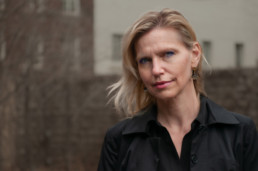
A Sense of Place
In a move that confounded extended family, Carolyne moved from Ontario to Quebec at a time when a lot of anglophones were leaving the province.
The politics of language can be a deterrent to some, but for Carolyne, the French language and culture were what drew her to Montreal and decades later, remains an important part of her identity.
Having a sense of place is important to her.
You can see it in her writing—the titles of her poems often take the names of places. Like an actor donning a costume, they help to set the stage and draw the reader in.
For Carolyne, they serve to inspire, to root the poem in place and time, and in some sense, they act as “souvenirs,” bringing the memories of a place rushing back.
Place also refers to a metaphysical state. “Being in a good headspace is a good place to write,” Carolyne says. After over a decade of focusing on her poetry, she has come to realize poetry can also bring you to such a place.
“When I started writing poetry again, I didn’t think of it as a kind of saviour—but I do now because I feel it has carried me through difficult periods in my life. I think that I get a sense of peace from it, probably in part because I can get lost in it.”
But finding her place as a writer of poetry is something that Carolyne has had to work towards. Finding your voice takes time.
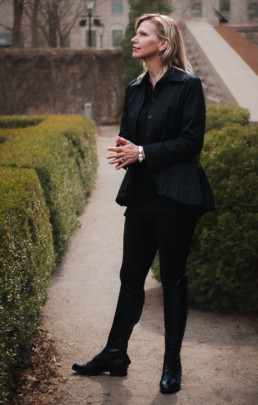
Finding Her Voice
In the last three years, poetry sales have exploded. This is thanks in part to the rise of Instapoets like Canadian poet Rupi Kaur who have brought new audiences to poetry with their modern take on a very old tradition.
A lot of today’s popular poetry is “snackable” and simple. Many criticize it for being too simple. But Carolyne does not disparage it: “Instapoetry has its place, and it brings welcome attention to poetry,” she says. But her own particular style of poetry is distinctly narrative, borrowing largely from the Irish tradition.
With her fourth book, Sensorial, launching in May, it appears Carolyne has affirmed her presence in a style and voice all her own.
In it, Carolyne deals with themes of homelessness and displacement, as well as the complicated nature of relationships.
While it would have been easy to take a critical approach to these issues, Carolyne treats them with compassion.
“Sometimes it’s better to just observe so that we can try to understand as opposed to judging,” she says.
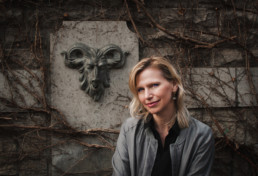
Old Montreal, Qc (Imagined)
Carolyne is seated on the street-side terrasse of a small café. It could be Europe but is decidedly Montreal. She sips a cappuccino while taking in the sounds of French conversation around her.
Being a successful small business owner affords her a little time to live a creative life. Her two professional lives have finally come together harmoniously.
On this day, the work done, she is content to be here, at this moment, taking it all in, savouring the sounds, the scents, the feelings.
Perhaps later she will put this moment to poetry—economically and with purpose—for a reader somewhere to read and be transported.
“The things we read,” says Carolyne, “bring us to a different place. They enable a deeper understanding. And maybe for somebody out there, something I’ve written has resulted in that. That’s what I hope.”
Poets to Discover
Carolyne has heard a lot of people say that poetry is intimidating. And while it may be true in some cases, poets she says, don’t necessarily set out to confuse. She encourages people to not let poetry intimidate them and to keep an open mind. There's a lot of great poetry out there waiting to be discovered. Here, Carolyne has graciously shared some of her favourites. When you’re ready, be sure to give them a chance.
- Shakespeare: All of Shakespeare is worth reading but I am talking specifically about his sonnets. Here you can learn about iambic pentameter (10 syllables per line), the power of the rhyme scheme and the craft of writing a 14-line wonder.
- Elizabeth Bishop (American but spent much of her childhood with her grandparents in Great Village, Nova Scotia): This poet maintained a personal distance in her poetry, enabling a different kind of power: one of objectivity and economy.
- Ada Limón (American): A master of the narrative poem, Limón tells uniquely powerful stories in a few short lines. I love her use of the horse—few poets do it as well as she does.
- Anne Carson (Canadian): A classicist by training—and a translator of ancient languages, Carson is almost an anachronism: she seems to harken from another time in the way she tells stories using mythologies and storytelling techniques.
- Seamus Heaney (Northern Irish): Known as a naturalist poet, Heaney's work focused on elements of local Irish life and its rural, parochial characteristics. Winner of the 1995 Nobel Prize in Literature, he is often considered the best Irish poet since W.B. Yeats.
- Mary Oliver (American): Nature, nature, nature. Oliver's work is an ode to it—and worthy of significant praise.
- Margaret Avison (Canadian): Often compared to 17th-century poets for the metaphysical quality of her work, Avison has been praised for the power of the images in her poetry.
- Steven Heighton (Canadian): A crafty writer of poetry, novels, short stories, essays, songs and guides on craft, Heighton pulls much from the classics and from classical poetry but with a decidedly contemporary twist. His recent passing at the age of 60 is a great loss and reading/listening to his extraordinary work will keep his voice alive.
Carolyne Van Der Meer is a journalist, public relations professional and university lecturer. She has published several books: Motherlode: A Mosaic of Dutch Wartime Experience (2014), published by Wilfrid Laurier University Press; Journeywoman (2017) published by Inanna; and Heart of Goodness: The Life of Marguerite Bourgeoys in 30 Poems (2020), published by Guernica. This last book, which Carolyne translated herself into French, was awarded second place in the poetry category of the 2021 Catholic Media Association’s Annual Book Awards. Carolyne’s fourth book, Sensorial will be released by Inanna in May. She lives with her family in Montreal, Quebec.
Bryan Gagnon
Working as a Digital Marketer, Designer and Content Producer, Bryan has launched numerous successful websites and digital campaigns in the public sphere. He is an accomplished photographer offering portraits, headshots, family documentary photography, and more. His project FLOW, which features his writing and photography, profiles individuals aged 40+ who are pursuing passion projects or lifestyles.
Related Posts:
Ann Shea: Turning a New Page
When Ann Shea followed Mill Street Books’ Facebook page, she never imagined the small act would forever alter the course of her life.
0 Comments9 Minutes
Vankleek Hill Tulip Fields: Where Hope Has Sprung
The pandemic inspired Mike Block and Sandra Bebbington-Block to make a change. Following their passion, they moved to Vankleek Hill and started their own tulip business.
0 Comments7 Minutes
Trading A Life of Science for Killer Jeans
Patricia Gomez Zlatar left a budding career as a scientist in order to pursue her true calling—writing and producing horror films.
0 Comments11 Minutes

